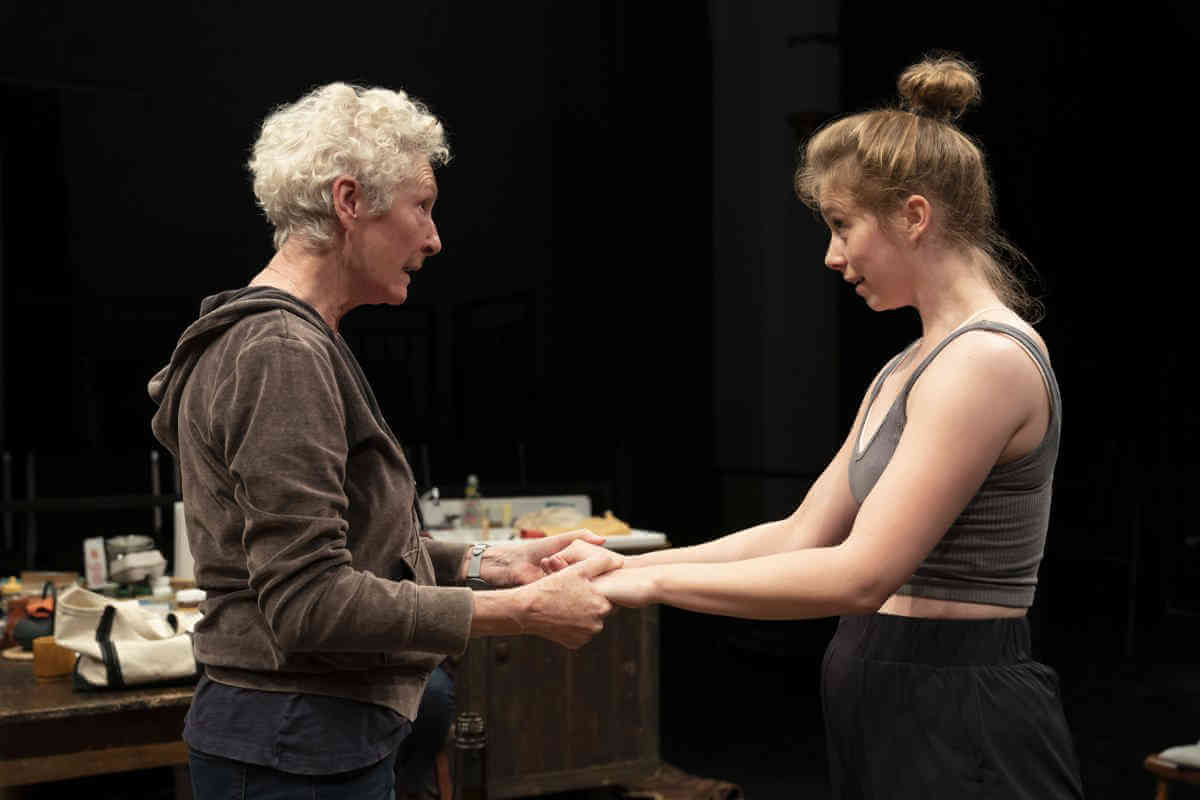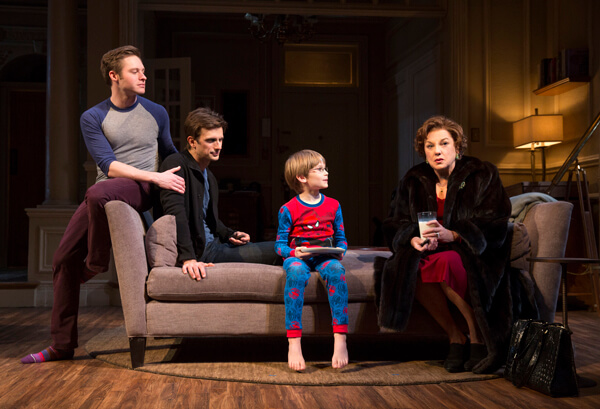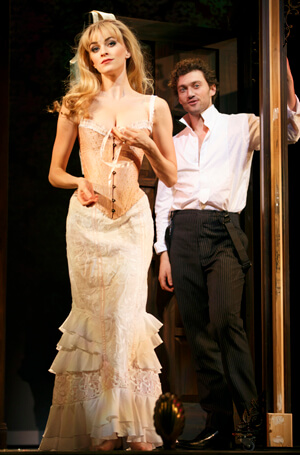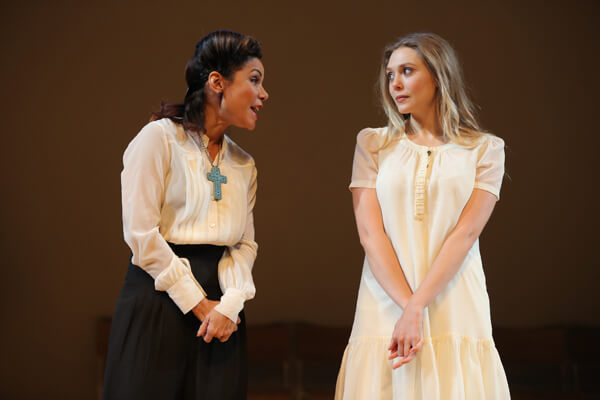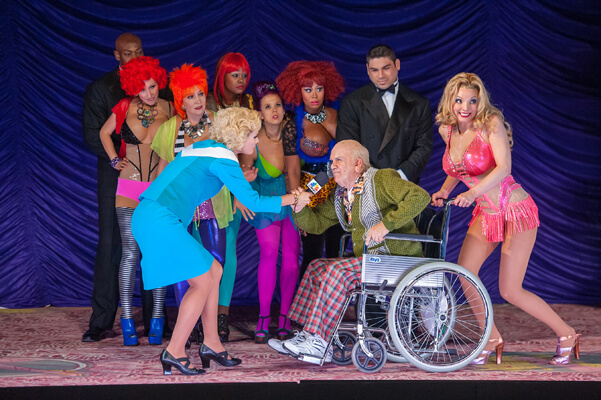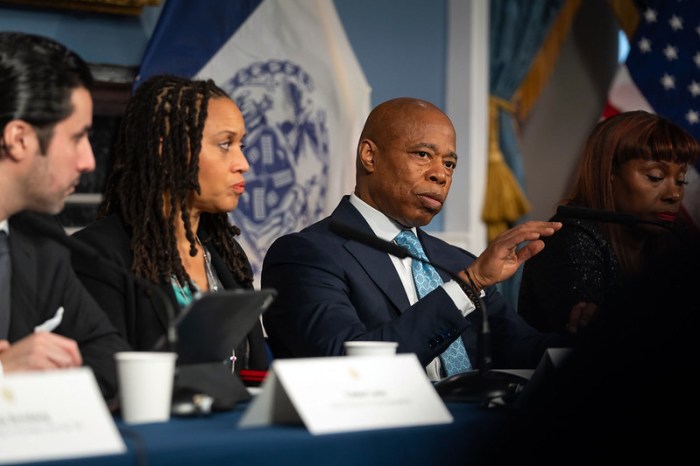The laconic pacing and quiet conversation of Richard Nelson’s latest play “The Michaels” is the playwright’s hallmark. The seventh play in his Rhinebeck Panorama series takes place in the kitchen of the eponymous family as they prepare dinner one quietly eventful evening.
As with Nelson’s previous plays — the Apple and Gabriel family trilogies — “The Michaels” is not plot-driven. Although there’s the thread of a storyline, that takes second place to finely etched characters and how intimately we come to know them over the course of just two hours. Nelson is a master of economical exposition, and as the evening unfolds we feel as if we are actually in the kitchen with the family. At first, we’re strangers, having to piece together the relationships and try to understand the interpersonal dynamics. Yet just as the meal comes together over the course of the play, so too does the full picture of the family. By the end, we feel a connection and kind of intimacy that is profoundly moving.
Nelson, who directed the piece as well, finds truth in every detail of relationship and behavior. It is both heartbreaking and hopeful — and also as close to pure naturalism as you will find in the theater today.
While Nelson’s other plays had political overtones and dealt with the gentrification of once decidedly exurban Rhinebeck in the current economy, the life of “The Michaels: Conversations During Difficult Times,” the play’s full title, is focused on the family. The “difficult times” are of a more personal nature, but there’s just enough of the outside world to firmly locate the piece in the here and now.
“The Michaels” begins as Nelson’s other plays do. The cast sets up the kitchen as the lights come up, drawing us into the life of the house that belongs to Rose Michael. Here for Sunday dinner are her former husband David, his new wife Sally, David and Rose’s daughter Lucy, and Lucy’s cousin May, daughter to Rose’s sister who is talked about but never seen. Joining the family is Irenie Walker who has arrived for a week’s visit. Rose was at one time a famed modern dance choreographer, and Sally and Irenie were in her company some decades ago. Lucy and May are preparing to perform some of Rose’s famous dances in an upcoming tribute. Rose’s partner, Kate, a retired history teacher, is managing the dinner and Rose’s life, for as we come to learn Rose has late stage ovarian cancer.
Rose is decidedly not going gently into that good night. Though revered by all, she is prickly and unsettled as she resists talking about her illness, instead insisting on coaching Lucy and May in their dances. There are memories shared of the early days of Rose’s company as boxes of old pictures come out. Later, watching the young women perform, Rose says, “I see ghosts.” It is a poignant moment, with Rose caught between the power of art to create life and her cognizance of mortality. The play is full of ostensibly small moments like that, and many have tremendous emotional power.
It would be impossible to imagine a more perfect cast than Nelson has assembled. Jay O. Sanders and Maryann Plunkett, who have appeared in his other works, are sublime as David and Kate, with Plunkett’s performance especially nuanced. Kate is the only character not involved in dance or a part of the others’ history, but she is Rose’s partner. It’s a complex situation, and Plunkett lets us feel all of that. Brenda Whele fills Rose’s passion and determination with muted fire. We see what has driven her and feel the toll her illness is taking on her. Haviland Morris is a gentle and loving Irenie, an outsider a bit like Kate. Charlotte Bydwell and Matilda Sakamoto as Lucy and May, respectively, are exceptional dancers, and their fear of facing Rose’s fate is moving. Feelings of impending loss are new to these young women. Rita Wolf as Sally reveals a surprising depth and rich emotional life, often in the most subtle moments.
As the family tries to come to terms with the inevitable loss of Rose, they fall back on that all-too-contemporary bromide “It is what it is.” As the family quietly repeats that, almost like a mantra, David asks, “But what is it?” The moment is both telling and deeply moving. Like all of us, the Michaels are struggling to make sense of life — and the effort, if not the answer, is palpable. And that’s powerful theater.
After Bryan Cranston’s Tony-winning performance as President Lyndon B. Johnson in “All the Way,” which also took the award for Best Play, the excitement for “The Great Society,” the next installment in the LBJ saga, was high. Having tackled the period from Johnson’s becoming president after JFK’s assassination to the passing of the Civil Rights Act of 1964 and his winning election that year, playwright Robert Schenkkan took on the period just after that monumental victory through LBJ’s decision not to seek a second full term.
After Cranston’s tour de force, no lesser actor than Brian Cox was tapped to play LBJ through some of the greatest struggles of his presidency — the Watts riots, his battles with George Wallace as he moves to expand the scope of his civil rights agenda, and the escalation of the war in Vietnam and the resulting protests — that ultimately were his undoing.
It’s an epic undertaking, but unfortunately the result is more a documentary or a pageant than a play. It might be a speculative exercise to explore the inner lives of the characters, but that would at least turn the story into a play, however apocryphal it might be. The surface presentation of events, with brief moments of dramatization, feels cold and distant. That might be fine for a history class, but on stage it quickly falls flat.
Cox, who is a fine actor, hasn’t been given much to do and as a result turns in a largely one-note performance. His LBJ is angry, argumentative, and loud for virtually the entire piece. He turns quiet only at the very end in a short scene with his wife, Lady Bird, but by that time the audience is more worn out than empathetic. There are attempts to convey LBJ’s folksy side — with earthy anecdotes as well as halting condolences to the families of soldiers who died in Vietnam — but these moments feel forced into the script, as if Schenkkan knew he had to humanize his protagonist but didn’t quite know how. We see some of LBJ’s fabled political prowess as he wangles a deal for Medicare or trumps Wallace, and we also spy his blind side when J. Edgar Hoover tricks him into abandoning Martin Luther King, Jr. These scenes, however, provide no true insights into the characters or the issues at stake. Instead, they simply recount historical occurrences.
Director Bill Rauch takes a workmanlike approach, creating scenes sadly devoid of subtlety. He has staged the piece in what might be a combat arena, but the unmistakable metaphor that politics is an ongoing battle is never really developed.
In addition to Cox, the cast is filled with standout actors — Richard Thomas as Hubert Humphrey, Bryce Pinkham as Bobby Kennedy, David Garrison as Wallace (and Richard Nixon), and Grantham Coleman as King, to name a few. Unfortunately, the underdeveloped script reduces them to two-dimensional figures.
This is an ambitious piece, but ambition can lead to failure. That can still be dramatic, but in “The Great Society” it’s never great. It’s only so-so.
THE MICHAELS | Public Theater, 475 Lafayette St., btwn. E. Fourth St. & Astor Pl. | Through Dec. 1: Tue.-Sun. at 7:30 p.m.; Sat.-Sun. at 1:30 p.m. | $60-$89 at publictheater.org or 212-967-7555 | Two hrs., no intermission
THE GREAT SOCIETY | Vivian Beaumont Theatre at Lincoln Center, 150 W. 65th St. | Through Nov. 30: Tue.-Thu. at 7 p.m.; Fri.-Sat. at 8 p.m.; Wed. at 1 p.m.; Sat. at 2 p.m. | $59-$159 at telecharge.com or 212-239-6200 | Two hrs., 40 mins., with intermission


